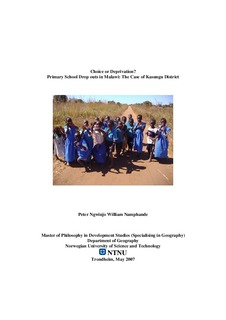| dc.contributor.author | Namphande, Peter Ngwinjo William | nb_NO |
| dc.date.accessioned | 2014-12-19T14:25:30Z | |
| dc.date.available | 2014-12-19T14:25:30Z | |
| dc.date.created | 2007-06-18 | nb_NO |
| dc.date.issued | 2007 | nb_NO |
| dc.identifier | 122426 | nb_NO |
| dc.identifier.uri | http://hdl.handle.net/11250/265209 | |
| dc.description.abstract | For a country to develop, it needs an educated human resource. Besides the benefits of education to society, individuals have a better chance of escaping from poverty if they have the right kind and right levels of education. A Lack of functional education constitutes a deprivation of a basic capability. The purpose of this study was to find out the underlying causes of primary school drop out in Kasungu district, Malawi. It was undertaken to find out whether school drop out in this tobacco growing area was a result of deprivation or a matter of choice. The study followed a qualitative research design and the populations of interest were children who had dropped out of school, and their parents/ guardians. Several key informants also contributed to the study as well as a traditional leader. Data were gathered through semi-structured interviews, in-depth interviews, and direct observation of phenomena. The Capability Approach by Amartya Sen was used in the analytical approach and framework. Data were analyzed by a coding system in which relevant and related passages to the research concerns were placed under themes which were presented in the writing as narratives using direct quotes from research participants.
The major finding of the study was that children drop out of school in the district as a result of deprivation of basic capabilities. It was observed that communities in the study area complimented the role played by Government in the provision of places for education since the introduction of Free Primary Education (FPE). Although communities were endowed with schools, there were a number of factors which prevented people from taking advantage of such endowments. The Ministry of Education had not played its role of supplying learning materials satisfactorily. The lack of supply of learning materials to schools had the effect of limiting the access of pupils from poor households from attaining education. Similarly, communities in the study area expressed their dismay at the effectiveness and relevance of the education their children were getting. It was observed that people did not appreciate the role primary education played in their children since school graduates lacked marketable, and survival skills which could give them a meaningful occupation. As a result, parents/ guardians in some cases withdrew their contributions from activities meant to improve pupils’ learning environments. Furthermore, most households placed more value on cultural practices at the expense of children’s chances of schooling. It was noted that deprivations at the household level such as lack of command over adequate amounts of food, ill health, and death resulted in permanent damage done to the education prospects of children from vulnerable households. This was the case because the only entitlements at the command of most households were their labor and land. As such where unfreedoms existed, vulnerable households involved all the children available in the household to cope with such threats. As a result the schooling chances of children suffered. The study further observed that some parents directly discouraged their wards/ children from schooling due to their lack of support. Girls were noted to be the most deprived of educational opportunities due to the cultural roles played by females as caregivers, mothers, and wives. | nb_NO |
| dc.language | eng | nb_NO |
| dc.publisher | Fakultet for samfunnsvitenskap og teknologiledelse | nb_NO |
| dc.subject | Master of Philosophy in Development Studies, specialising in Geography | en_GB |
| dc.title | Choice or Deprivation?: Primary School Drop outs in Malawi: The Case of Kasungu District | nb_NO |
| dc.type | Master thesis | nb_NO |
| dc.contributor.department | Norges teknisk-naturvitenskapelige universitet, Fakultet for samfunnsvitenskap og teknologiledelse, Geografisk institutt | nb_NO |
